TTUHSC Medical Students Educate about COVID-19 Vaccination Misconceptions with Outreach to Hispanic Communities
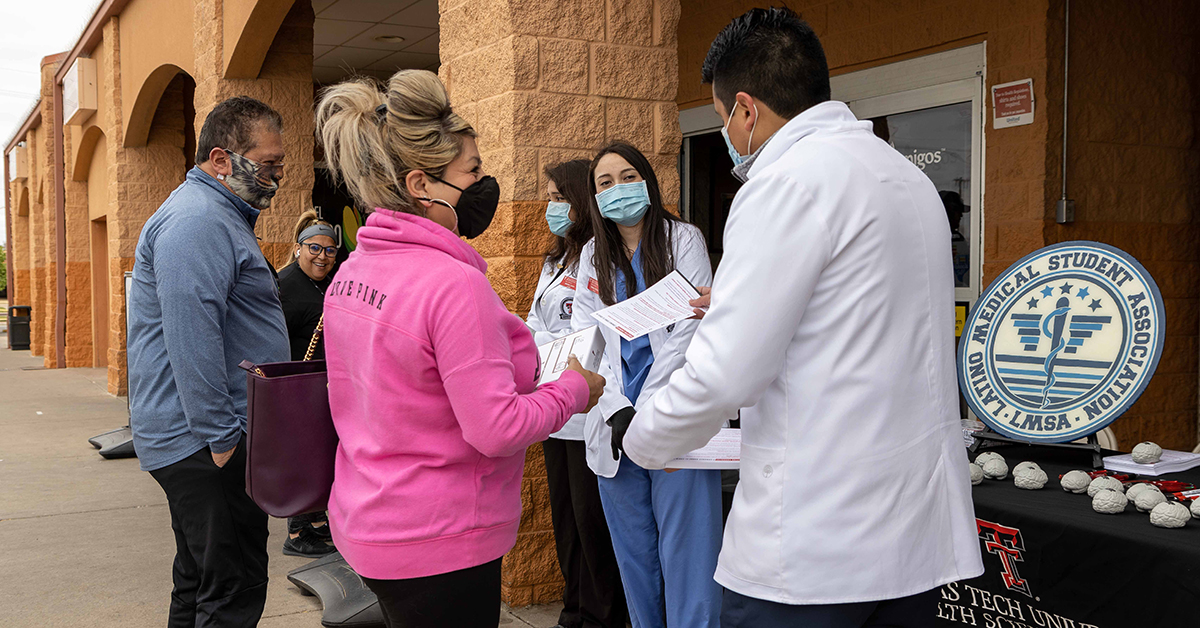
According to the Centers for Disease Control and Prevention (CDC), Hispanics are twice as likely to die from COVID-19 than non-Hispanic whites. Despite higher rates of infection and death from COVID-19, the CDC report showed minorities are getting vaccinated at disproportionately lower rates compared to non-Hispanic whites. In a CDC report of demographic characteristics of persons vaccinated during the first months of the COVID-19 Vaccination Program, U.S. Latinos received about 11.5% of the vaccinations, while Non-Hispanic white people received more than 60% of the vaccines.
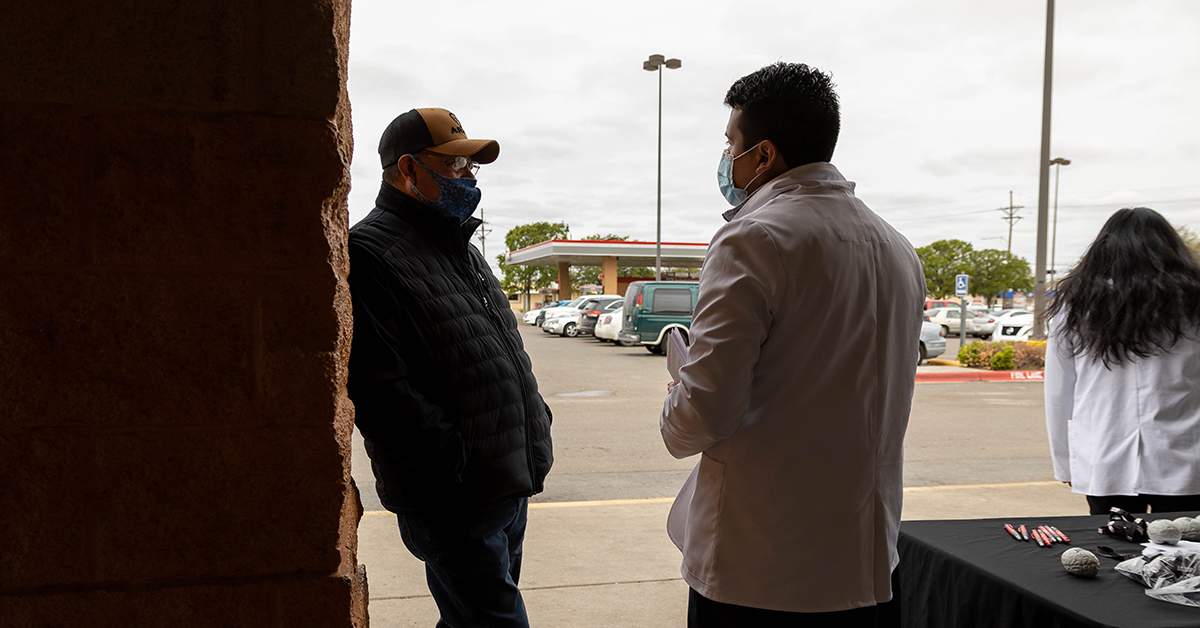
To help address this disparity, student members of the Texas Tech University Health Sciences Center (TTUHSC) Latino Medical Student Association (LMSA) answered questions and myths about the COVID-19 vaccine for the Hispanic community on April 17 at Amigos United Supermarket.
Luis Castro, second-year TTUHSC School of Medicine student and LMSA vice president, said misinformation and lack of vaccine knowledge could be one reason for low vaccination rates in these demographics.
“Many in our communities may have misconceptions about the COVID-19 vaccine or just don’t know who to ask about any fears they have,” Castro said.
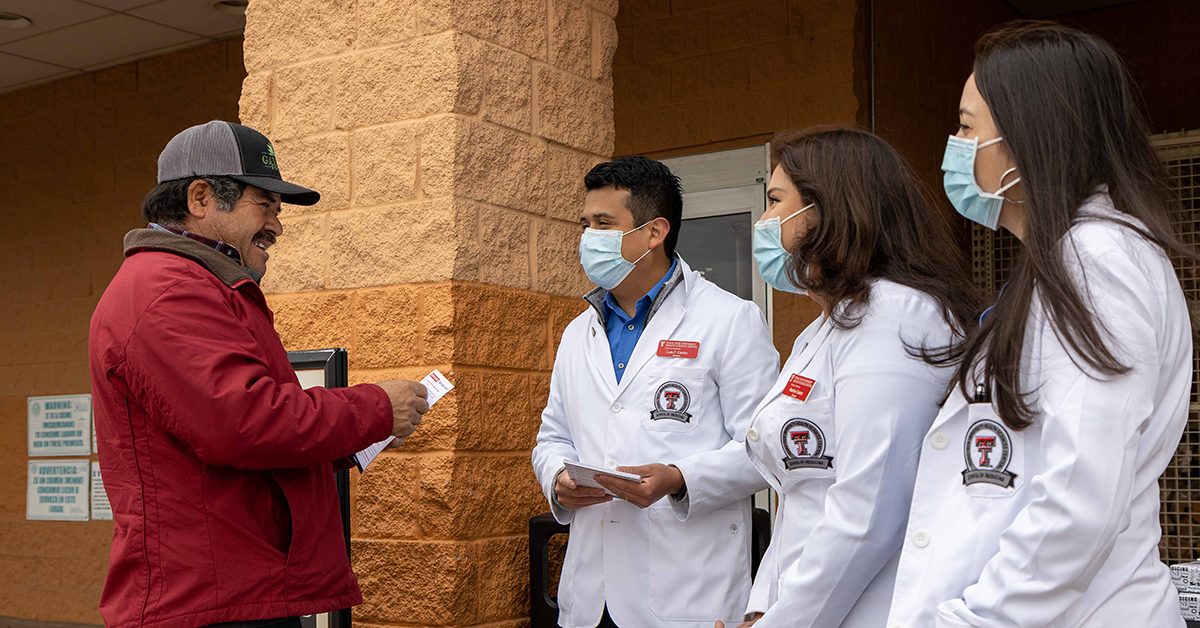
LMSA exists to unite and empower medical students through service and mentorship. Castro said the TTUHSC School of Medicine chapter wants to advocate for the health of the Latino community, especially during this pandemic. This will be the first of many outreach efforts by LMSA.
“Our hope is to go out to communities with Spanish-speaking members and help get some of these questions answered. Once we do that, hopefully they will have the facts and feel better about getting the vaccine to protect themselves and their families.”
Common misconceptions about COVID-19 vaccines are as follows and also included in Spanish:
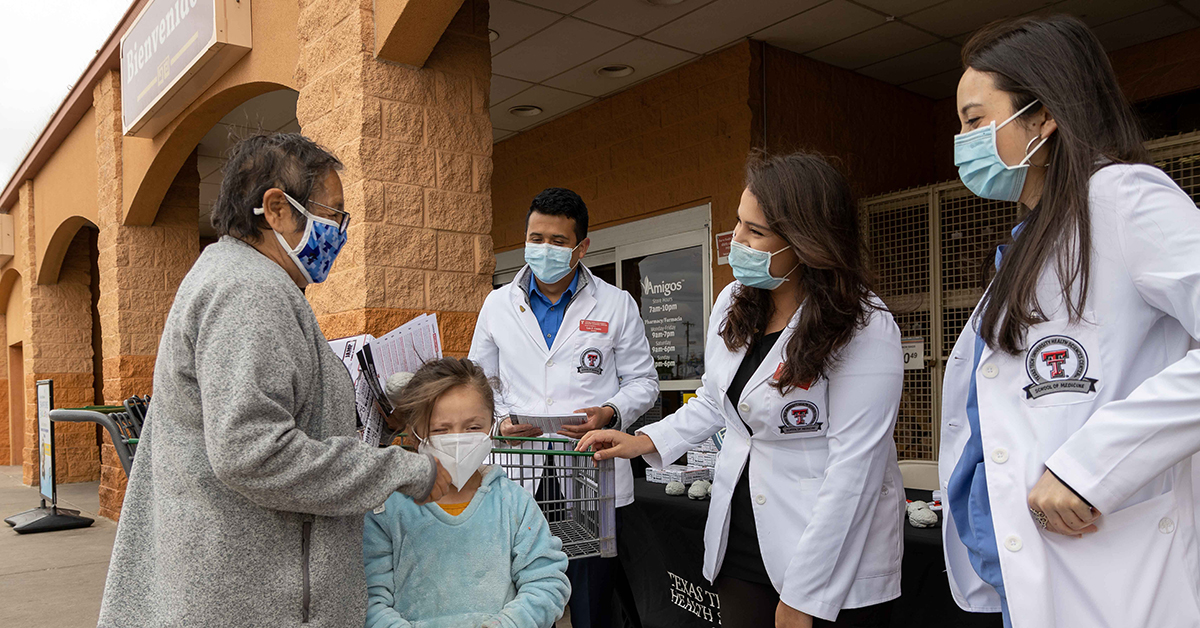
- The COVID-19 vaccines are unsafe because they were created too quickly
While it is true that vaccines were developed quickly, they did so without compromising safety. Each vaccine was studied on at least 30,000 volunteers without significant adverse events. - The vaccines will make me sick!
None of the currently approved vaccines carry the live virus. Therefore, the vaccine cannot make you sick. Pain at site of injection is normal, along with fever and chills, tiredness, muscle aches and a headache. The effects are temporary, and it does not mean you have COVID-19. - I can avoid getting COVID-19 by taking Vitamin C, Zinc and herbal teas.
While it is true that taking vitamins and natural supplements can boost your immune system and protect you from the virus, there is no evidence they are enough to cure or treat COVID-19. - The vaccines can cause infertility.
This idea has become very popular in social media but there is no evidence from the clinical trials showing any support for this. - Do I need to have health insurance to be eligible to receive the vaccine?
No, the vaccine has been purchased by the federal government and is being administered free of cost. - Undocumented immigrants are not allowed to be vaccinated.
The federal government recognizes it is important for everyone in this country to be vaccinated, regardless of immigration status. U.S. Immigration and Customs Enforcement (ICE) has agreed not to carry out enforcement operations near health care facilities, hospitals, doctor’s offices and vaccination clinics. - Getting treated, tested, or vaccinated for COVID-19 will count against me when trying
to obtain a Green Card because of the “Public Charge” test.
No, getting treated, tested or vaccinated for COVID-19 will not affect your chances of obtaining legal residency. This was announced on the U.S. Citizenship and Immigration Services website.
Conceptos Erróneos y Comunes Sobre el COVID-19:
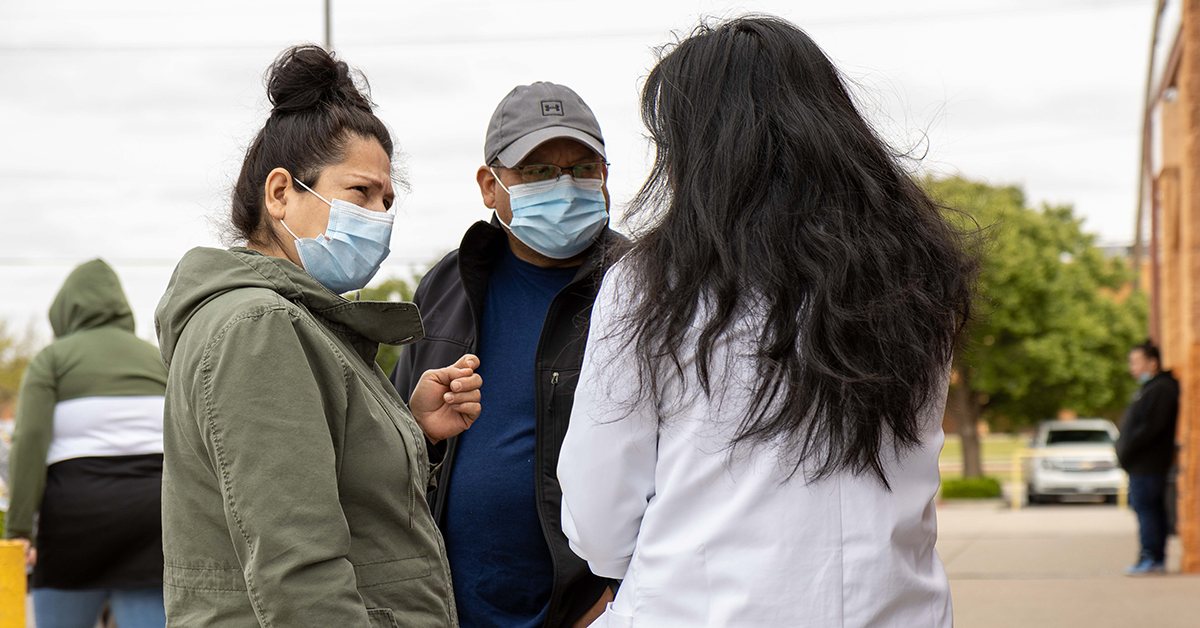
- Las vacunas del COVID-19 no son seguras porque se crearon demasiado rápido
Aunque es cierto que las vacunas se desarrollaron rápidamente, lo hicieron sin comprometer la seguridad. Cada vacuna se estudió en al menos 30,000 voluntarios sin efectos secundarios severos.
- ¡Las vacunas me enfermarán!
Ninguna de las vacunas aprobadas actualmente es portadora del virus vivo. Por lo tanto, la vacuna no puede enfermarlo. Es normal sentir dolor en el lugar de la inyección, fiebre y escalofríos, cansancio, dolores musculares y dolor de cabeza. Los efectos son temporales y no significa que tenga COVID-19. - Puedo evitar contraer COVID-19 tomando Vitamina C, Zinc o tés medicinales.
Aunque es cierto que tomar vitaminas y suplementos naturales puede estimular su sistema inmunológico y pueden ayudar a protegerlo contra el virus, no hay evidencia que demuestre que sean suficientes para curar o tratrar el COVID-19. - Las vacunas pueden causar infertilidad.
Esta idea se ha vuelto muy popular en las redes sociales, pero no hay evidencia de estudios clínicos que demuestren apoyo para esta idea. - No se permite vacunar a los inmigrantes indocumentados.
El gobierno federal reconoce que es importante que todos en este país estén vacunados, independientemente de sue status migratorio. ICE acordó no ejecutar redadas de inmigración cerca de instalaciones de atención médica, hospitals, consultorios médicos y clínicas de vacunación. - Recibir tratamiento, hacerme la prueba o vacunarme contra el COVID-19 contará en mi contra cuando intente obtener residencia legal debido a la prueba de “Carga Pública” No, recibir tratamiento, hacerse la prueba o vacunarse contra el COVID-19 no afectará sus posibilidades de obtener residencia legal. USCIS anunció esto en su sitio web.
- ¿Necesito tener seguro médico para ser elegible para recibir la vacuna?
No, la vacuna ha sido comprada por el gobierno federal y se administra gratuitamente.
Related Stories
Celebrating Veterans: TTUHSC’s General Martin Clay’s Legacy of Service and Leadership
From his initial enlistment in the Army National Guard 36 years ago to his leadership in military and civilian health care management roles, Major General Martin Clay’s career has been shaped by adaptability, mission focus and service to others.
Texas Tech University Health Sciences Center School of Nursing Named Best Accelerated Bachelor of Science in Nursing Program in Texas
The TTUHSC School of Nursing Accelerated Bachelor of Science in Nursing (BSN) program has been ranked the No. 1 accelerated nursing program in Texas by RegisteredNursing.org.
TTUHSC Names New Regional Dean for the School of Nursing
Louise Rice, DNP, RN, has been named regional dean of the TTUHSC School of Nursing on the Amarillo campus.
Recent Stories
National Academy of Inventors Names TTUHSC Faculty Senior Members
The National Academy of Inventors (NAI) has designated two current and one former TTUHSC faculty researchers as Senior Members.
The John Wayne Cancer Foundation Surgical Oncology Fellowship Program at Texas Tech University Health Sciences Center Announced
TTUHSC is collaborating with the John Wayne Cancer Foundation and has established the Big Cure Endowment, which supports the university’s efforts to reduce cancer incidence and increase survivability of people in rural and underserved areas.
TTUHSC Receives $1 Million Gift from Amarillo National Bank to Expand and Enhance Pediatric Care in the Panhandle
TTUHSC School of Medicine leaders accepted a $1 million philanthropic gift from Amarillo National Bank on Tuesday (Feb. 10), marking a transformational investment in pediatric care for the Texas Panhandle.
